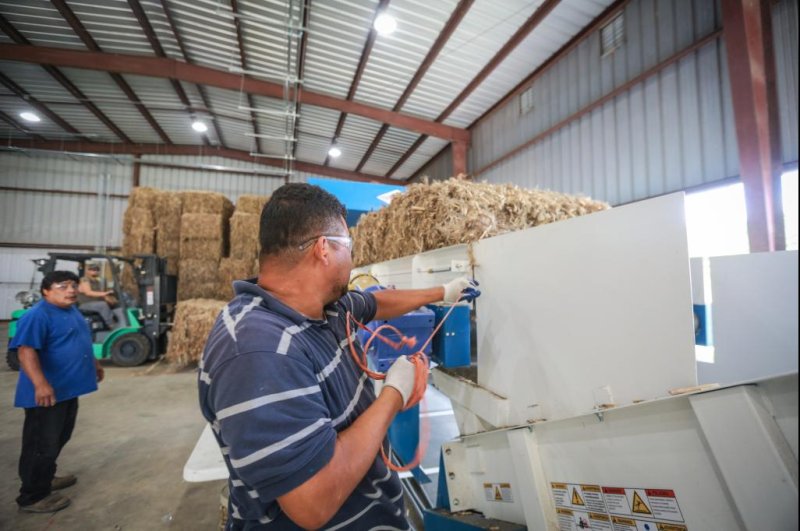(Total Views: 1272)
Posted On: 10/08/2019 10:58:12 PM
Post# of 990

Hemp Inc, bioplastics expand crop use beyond CBD
DENVER, Oct. 2 (UPI) -- Most U.S. farmers are growing hemp for cannabidiol, but hemp-based hardwood and bioplastics businesses have sprouted up this fall, expanding the newly legal crop's potential.

Hemp has been promoted as a plant material that can be made into 50,000 different products, but uses other than extracting CBD -- a compound found in marijuana that doesn't get you high -- have been slow to grow.
Murray, Ky.-based HempWood opened a 15,600-square-foot factory last month with the introduction of a wood-substitute plank made from hemp. The pressed boards are 20 percent denser than oak, and the plant material can be grown in six months as opposed to 200 years for an oak tree, the company, Fibonacci LLC, said.
Hardwood panels, which can be used for flooring, furniture and other woodworking projects, are based on a technology adapted from the bamboo industry, said John Crye, the company's director of sales and marketing.
"We're in the forefront of the hemp fiber industry, and I don't know how many people are buying it besides, us," Crye said. "There appears to be lots of room for new entrants in the market."
Industrial hemp stalks, about 6 feet high, are harvested and cold-pressed with resins to make a grain-patterned wood product, Crye said.
The stalky fiber plant has a different shape than the bushy hemp plants grown by many U.S. farmers for CBD. All hemp plants are members of the cannabis family, relatives of their THC-laden cousin marijuana.
Fibonacci employs eight people and plans to hire two more per month, ultimately hoping to employ 50 workers to run two shifts, owners said.
The Kentucky Economic Development Finance Authority granted $300,000 in employment-based tax incentives for the $5.6 million factory.
Crye said the idea is to use tall fiber hemp grown within 100 miles. The firm has contracted with local farmers in Western Kentucky for 1,300 acres.
The chairman of the House Agriculture Committee, Collin Peterson, D-Minn., and U.S. Rep. James Comer, R-Ky., who represents the western part of the state, visited the factory last month to learn about potential for the industry.
Owners still need to navigate hemp-related banking restrictions and other hurdles, but have plans to eventually open more HempWood plants in "strategic locations" around the United States, Crye said.
Hemp particle board
HardWood's use of hemp is not the first time hemp-based wood products have been engineered in North America. Hemp waste material has been used to successfully create particle board in Canada.
In 2017, materials engineers at the University of British Columbia-Vancouver created a composite particle board of ground hemp hurd, flax and special resin glue. Hemp hurd is the soft inner core of the plant stem.
Particle board makes up the underlying wood for most furniture and kitchen cabinets. The composite wood, made from sawmill scraps, is covered with a laminate.
Wood engineer Solace Sam-Brew's hemp and flax-based board actually beat hardwoods in a water swell test, said Gregory Smith, a composite materials professor at the university. The test measures how much liquid can be absorbed by a material.
Bioplastics from hemp
In North Carolina, a hemp company is investing in the supply chain for bioplastics. Three years ago, Las Vegas-based Hemp Inc., a publicly traded hemp company, converted a former Spring Hope, N.C., sweet potato-processing plant to an 85,000-square-foot industrial hemp processing lab, said Bruce Perlowin, CEO and founder of the company.
The firm is milling a powdery bioplastic stock from hemp and kenaf -- another natural-fiber plant. For now, the company imports from Europe hemp hurd, a byproduct of hemp processing, and grinds it with kenaf.
"I'm in heaven that we're part of the supply chain to make bioplastic," Perlowin said. "I've been an environmentalist and eco-commando since I was in high school."
Hemp Inc. also has processing facilities in Oregon that extract CBD oil. The Spring Hope factory employs about 20 people. Hemp Inc. did not receive any tax incentives from the city or the state, Perlowin said.
Greer, S.C.-based Earth Renewable Technologies uses the milled biological fibers as a cellulose stock to create bioplastic hemp pellets that are melted into injection molds to make consumer goods.
The company uses plant material to make plastic bottles and containers, as well as films and coatings, housewares, non-woven cloth and 3D printing plastic stock.
Bioplastics are made of a lactic acid polymer and biological material, instead of petrochemicals, Kim Fabri, CEO of Earth Renewable Technologies, told UPI in an email. In composting conditions, they degrade much faster (in as few as 90 days) compared to "hundreds of years a fossil fuel polymer takes."
Fabri said it is difficult to find hemp plant matter to use in the company's products.
Before bioplastics companies can grow and experiment with hemp-based products, a pathway has to be built from the plant to the plastic, Perlowin said. There are too few hemp processing facilities to generate the raw materials needed by plastic companies, he said.
"Our company has one machine, but there should be 200 processing facilities all over the United States," he said.
Source...
DENVER, Oct. 2 (UPI) -- Most U.S. farmers are growing hemp for cannabidiol, but hemp-based hardwood and bioplastics businesses have sprouted up this fall, expanding the newly legal crop's potential.

Hemp has been promoted as a plant material that can be made into 50,000 different products, but uses other than extracting CBD -- a compound found in marijuana that doesn't get you high -- have been slow to grow.
Murray, Ky.-based HempWood opened a 15,600-square-foot factory last month with the introduction of a wood-substitute plank made from hemp. The pressed boards are 20 percent denser than oak, and the plant material can be grown in six months as opposed to 200 years for an oak tree, the company, Fibonacci LLC, said.
Hardwood panels, which can be used for flooring, furniture and other woodworking projects, are based on a technology adapted from the bamboo industry, said John Crye, the company's director of sales and marketing.
"We're in the forefront of the hemp fiber industry, and I don't know how many people are buying it besides, us," Crye said. "There appears to be lots of room for new entrants in the market."
Industrial hemp stalks, about 6 feet high, are harvested and cold-pressed with resins to make a grain-patterned wood product, Crye said.
The stalky fiber plant has a different shape than the bushy hemp plants grown by many U.S. farmers for CBD. All hemp plants are members of the cannabis family, relatives of their THC-laden cousin marijuana.
Fibonacci employs eight people and plans to hire two more per month, ultimately hoping to employ 50 workers to run two shifts, owners said.
The Kentucky Economic Development Finance Authority granted $300,000 in employment-based tax incentives for the $5.6 million factory.
Crye said the idea is to use tall fiber hemp grown within 100 miles. The firm has contracted with local farmers in Western Kentucky for 1,300 acres.
The chairman of the House Agriculture Committee, Collin Peterson, D-Minn., and U.S. Rep. James Comer, R-Ky., who represents the western part of the state, visited the factory last month to learn about potential for the industry.
Owners still need to navigate hemp-related banking restrictions and other hurdles, but have plans to eventually open more HempWood plants in "strategic locations" around the United States, Crye said.
Hemp particle board
HardWood's use of hemp is not the first time hemp-based wood products have been engineered in North America. Hemp waste material has been used to successfully create particle board in Canada.
In 2017, materials engineers at the University of British Columbia-Vancouver created a composite particle board of ground hemp hurd, flax and special resin glue. Hemp hurd is the soft inner core of the plant stem.
Particle board makes up the underlying wood for most furniture and kitchen cabinets. The composite wood, made from sawmill scraps, is covered with a laminate.
Wood engineer Solace Sam-Brew's hemp and flax-based board actually beat hardwoods in a water swell test, said Gregory Smith, a composite materials professor at the university. The test measures how much liquid can be absorbed by a material.
Bioplastics from hemp
In North Carolina, a hemp company is investing in the supply chain for bioplastics. Three years ago, Las Vegas-based Hemp Inc., a publicly traded hemp company, converted a former Spring Hope, N.C., sweet potato-processing plant to an 85,000-square-foot industrial hemp processing lab, said Bruce Perlowin, CEO and founder of the company.
The firm is milling a powdery bioplastic stock from hemp and kenaf -- another natural-fiber plant. For now, the company imports from Europe hemp hurd, a byproduct of hemp processing, and grinds it with kenaf.
"I'm in heaven that we're part of the supply chain to make bioplastic," Perlowin said. "I've been an environmentalist and eco-commando since I was in high school."
Hemp Inc. also has processing facilities in Oregon that extract CBD oil. The Spring Hope factory employs about 20 people. Hemp Inc. did not receive any tax incentives from the city or the state, Perlowin said.
Greer, S.C.-based Earth Renewable Technologies uses the milled biological fibers as a cellulose stock to create bioplastic hemp pellets that are melted into injection molds to make consumer goods.
The company uses plant material to make plastic bottles and containers, as well as films and coatings, housewares, non-woven cloth and 3D printing plastic stock.
Bioplastics are made of a lactic acid polymer and biological material, instead of petrochemicals, Kim Fabri, CEO of Earth Renewable Technologies, told UPI in an email. In composting conditions, they degrade much faster (in as few as 90 days) compared to "hundreds of years a fossil fuel polymer takes."
Fabri said it is difficult to find hemp plant matter to use in the company's products.
Before bioplastics companies can grow and experiment with hemp-based products, a pathway has to be built from the plant to the plastic, Perlowin said. There are too few hemp processing facilities to generate the raw materials needed by plastic companies, he said.
"Our company has one machine, but there should be 200 processing facilities all over the United States," he said.
Source...
